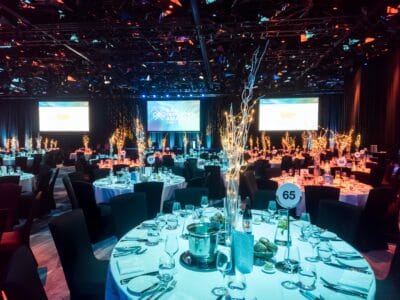Sustainable event management is possible. Event planning and event management are constantly bringing large crowds of people together, generating waste, and are generally the opposite of sustainable or green, but the good news is it doesn’t have to be like that. By creating sustainable and eco-friendly events, you can help educate your attendees about the importance of conserving resources and reducing their impact on the environment.
Creating Sustainable and Eco-Friendly Events

Being conscious of environmental impact isn’t just on-trend; it’s a necessity for all businesses in the 21st century. Now more than ever, consumers are more conscious and more aware of the impact they’re having on the environment and how well we’re taking care of the world. In order to stay competitive and continue to grow, businesses must embrace sustainable practices and create events that are environmentally friendly as well.
There are a number of ways to create sustainable and eco-friendly events, but the most important thing is to think about the impact your event will have on both you and the environment. By planning your event carefully, you can ensure that your guests have a positive experience while also reducing environmental waste.
In this article, we will outline some tips on how to create green, sustainable and eco-friendly events without sacrifice on your part or on the part of the attendees.
Planning a sustainable event begins with planning your budget. Try to find ways to cut costs without compromising on quality or your guests’ overall experience. One way to do this is to look into green event supplies and services that can be used in lieu of more traditional items. For example, you could rent an acoustic guitar instead of purchasing one, or ask local nurseries to provide free plants for a photo booth set up. By being conscious of your spending, you can make sure that every dollar goes towards enhancing the event experience rather than harming the environment.
Location, location!
The first major consideration you should make is where you’re holding your event. Try to pick a location that is as sustainable and environmentally friendly as possible. When choosing a venue, think about things like energy usage, transportation options and waste disposal. By picking a green and sustainable location, you can set the tone for your event and encourage your guests to be mindful of their environmental impact.
You’ll want to focus your attention on locations that have already made a dedicated effort to limit their environmental impact and have transparency with their customers on how they are achieving that.
Many venues now offer green cleaning services, sustainable catering options, and recyclable or compostable materials. If your event is large enough, you might also be able to negotiate a sponsorship from a local environmental organisation that can provide eco-friendly amenities for free or at a reduced cost. Some locations and venues can give you that information upfront. They will already have a package together to show you or a dedicated person who can answer those questions and work with you to find whatever you need to keep your event green and sustainable.
Reducing event waste
A big source of pollution that happens at events is waste and garbage. Planning for waste disposal is important. Many events generate a lot of waste, from catering supplies to discarded paper goods. plan for proper waste disposal and minimise the amount of waste that’s created by your event.
To eliminate a good amount of waste, make your event paperless. Send electronic invites out, or use a digital ticketing system in place of paper tickets. Another great suggestion is to use an event app to send out the program or schedule. It’s also a great way to get audiences involved and all responses in one place. Instead of giving out water bottles and items that are individually wrapped, have glasses and pitchers of water in common gathering areas so that they can get drinks. If you are giving out souvenirs or swag bags, try using recyclables or repurposed bags instead of plastic. Choose items that use sustainable wrappings.
Consider selecting environmentally friendly materials and products when possible. This can include using recycled or environmentally friendly materials, choosing organic foods and drinks, and using energy-efficient lighting, decorations and furnishings.
When it comes time to choose what materials to use for your event, you should always think about how eco-friendly those materials are. Some items you might want to avoid using include plastic water bottles, Styrofoam cups and containers, food packaging made from non-recyclable materials such as paper or plastic (even if it says it’s recyclable), and most synthetic fabrics. Instead, look for sustainable materials that can be easily recycled or composted after your event is over.

Eco-Friendly transport
Why not promote eco-friendly transportation options? Consider using public transportation, carpooling, or biking to get to and from the event. Educate your guests about the impact their actions have on the environment.
Another major consideration will be how far your attendees will have to travel and what sort of transportation it will take them to get there. Is the location close to the airports, hotels, or other modes of public transportation? Can your participants easily walk to the location from where they are staying or living? Is carpooling an option? When you choose your location, this will be a big consideration because fossil fuels from transportation are one of the biggest polluters on Earth.
If there is an option, see if you can set up group transport options or a shuttle service. Encourage participants to walk, bike, use public transport, or carpool to events to cut down on their environmental impact.
Educating guests and delegates
There are a number of ways to create sustainable and eco-friendly events without compromising on fun or entertainment. Utilising green and eco-friendly technologies, like incorporating environmental education into your events by educating attendees about environmental issues and how they can help improve the world.
Why not give your guests opportunities to get involved? Have a contest or give away eco-friendly prizes for those who take the most proactive steps to save the environment. Try incorporating eco-friendly programming into your events, such as recycling workshops, genealogy tours, or plant swaps.
By taking some simple steps, you can create an event that not only looks great on paper but also has a positive impact on the environment.
In conclusion
Being conscious of the environment while hosting an event can be surprisingly easy if you take the time to plan ahead and pay attention to detail. By incorporating green and eco-friendly technologies, environmentally friendly programs, and promoting public transportation options, you can create an event that not only looks great but also has a positive impact on the environment. You can create truly sustainable and eco-friendly events that will positively impact the environment and your guests.
This is by no means an exhaustive list of things you can do to plan sustainable and eco-friendly events, but they will certainly help to eliminate your carbon footprint and be environmentally conscious while still ensuring everyone has a great time and harming the environment. It will also show that you are a progressive-thinking event planner and that you have more than one way of helping those around you live in a better, healthier world.
Creating sustainable and eco-friendly events is possible – with a bit of preparation and effort, you can make your event an environmentally friendly success!
Stephanie Cassimatis is the founder and head stylist of Pink Caviar Events, a leading corporate event management and styling company based in Sydney, Australia. With over 20 years of experience in the industry, she has built a reputation for precision, creativity, and exceptional client service. A Certified Event Manager (CEM), Project Management Professional (PMP), and Certified Colour Consultant, Stephanie brings together strategic expertise and design sensibility to deliver events that are both seamless and visually impactful. She also shares her knowledge as a speaker and educator, empowering professionals to elevate their event design and execution.



